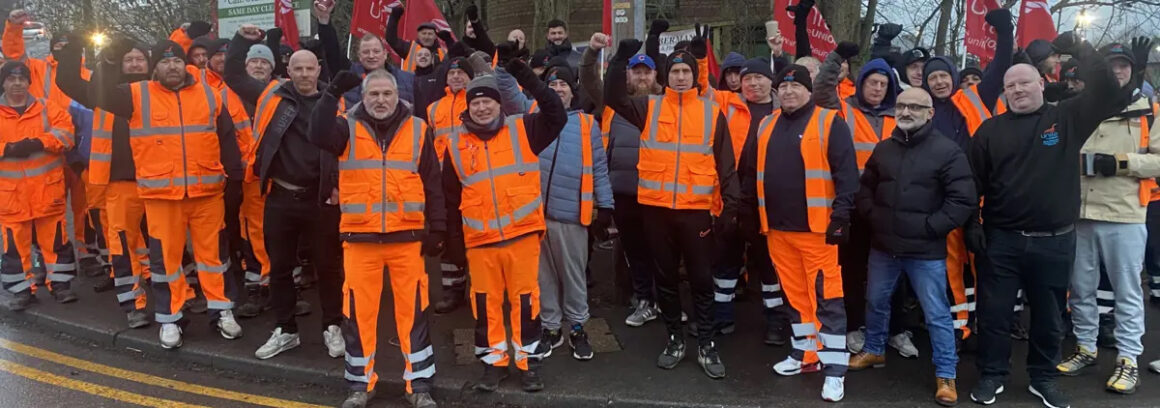

By Jeremy Dewar
Birmingham City Council’s refuse workers have been on indefinite strike since 11 March. Nearly 400 refuse collectors in the Unite union are refusing to accept the elimination of safety roles, downgrading and pay cuts. Their strike has become a beacon of resistance to Labour’s austerity programme, with a mega-picket being organised for 9 May.
The Labour-run council is £300 million in debt and has been made legally accountable to unelected commissioners appointed by the former Tory government. Labour has continued this arrangement, with Rachel Reeves refusing to bail out local councils. The £1 million annual cost of these commissioners, plus the 5.7% pay rise councillors voted for themselves, has not gone unnoticed by strikers.
The council wants to get rid of the 150 Waste Recycling and Collection Officers (WRCOs), loaders at the back of the wagons who are responsible for safety. They will be demoted and receive a 25% pay cut of £8,000 a year. The number of loaders per wagon will also be reduced from four to three.
After months of warning strikes, Labour councillors gave bin workers an ultimatum: accept the cuts or lose your jobs. This forced workers to escalate their strike to indefinite action.
All talks have proved fruitless. First deputy prime minister Angela Rayner promoted a ‘partial settlement’, which merely offered improved one-off compensation payments but still deleted the WRCO posts. This was rejected by 97% of the bin workers on 14 April.
As a punishment for this clearly unwelcome act of defiance, Labour swiftly authorised the army to enter the dispute and organise scab agency lorries. Scabbing went from a minor irritant to a threat. Pickets were stepped up and met with some success.
Police have responded by threatening to issue notices under Section 14 of the Public Order Act. Instead of pickets engaging in their legitimate task of asking workers not to scab, they are now routinely herded behind barriers many metres away.
Nevertheless, late last month Unite officials were claiming a deal was ‘within touching distance’, but these were also empty words. On 29 April council leader John Cotton, who had previously lied that ‘no worker needs to lose pay’, announced an £8,000 (20%) pay cut for wagon drivers. Up till then drivers were striking in solidarity with loaders; now they’re striking for themselves. And to push back against picketing restrictions, the strikers have called for a mega-picket at 6am on Friday 9 May.
This is not just a strike over a few hundred refuse collectors’ pay, though the threat to them and their families should not be underestimated. Many of them would face hardship, perhaps homelessness.
But who wins this dispute could also shape the resistance to council cuts and Labour’s austerity programme across the country. After all many councils, like Lambeth (£99m), are also facing huge cuts and others, like Nottingham, are in the grip of commissioners.
If the unions and the socialist left do not step up and confront these unjust cuts, then Reform UK will pose as the only alternative to incompetent and ‘wasteful’ Labour councils. Of course their Elon Musk-inspired cuts programmes would expose them as liars, but workers cannot afford to let them experiment with our jobs and services.
Unite and the other council unions, principally Unison, have the power to bring this dispute to a head. Unite should immediately call out its other members across the council to join the strike, by adding the demand of guarantees of no pay cuts, no downgrading, no job losses to all departments. A snap ballot, with bin strikers addressing workplace and zoom meetings, could bring thousands out before the end of May.
Unison has acted disgracefully, ordering its driver members to cross Unite picket lines. This must stop. Branch officers need to be on picket lines and order their members to refuse to scab, as is their right and duty. But why is Unison not on strike on its own terms? They need to demand a council-wide strike ballot, again inviting Unite bin workers to speak to Unison members about joining the dispute.
Mass pickets need to become regular, weekly events to draw in supporters from across the country. In particular, council, health and education unions should mobilise for these and use the experience to win similar action against their own cuts.
It is likely, as we have seen in other disputes and the Palestine solidarity movement, that mass pickets will spark police arrests. So the pickets need proper stewarding to prevent police snatch squads and organise ‘the push’. But if bigger numbers are needed, then Birmingham has a grand record of bringing workers out, if necessary by secondary strike action, stretching back to Saltley Gate in 1972.
None of this is possible without preparing to confront and if needed defy union officials. Up to now, Sharon Graham and Onay Kasab’s clever talking has won nothing. The strikers need to elect their own strike committee, so they can put the pressure on these officials to escalate the action, or make way for those who will.